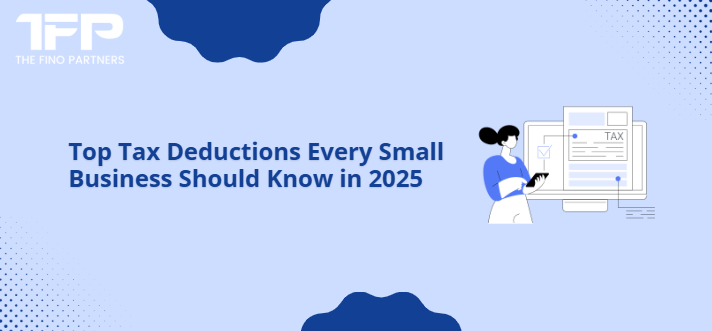As a small business proprietor in the U.S., managing your finances is vital. The most effective way to lower your tax income and save money is to make the most of available tax deductions in the USA. These deductions will bring down your taxes and let you invest in your business's development.
However, the complex tax code could be tough to navigate with all the regular updates and modifications. This guide is going to walk you through the top tax deductions every small business must know to make a judicious decision and enhance your tax approach.
Top 15 Tax Deduction Small Business Should Know
Below are the 15 deductions that every business owner in the US should know about:
1. Home Office deduction
In case you make use of a part of your house exclusively for business, you might qualify for the home Office Deduction. This particular deduction enables you to write off costs for using your house for business, for example a percentage of your mortgage or rent, utilities, and upkeep.
The IRS allows a simplified approach to calculating the deduction of $5 per square foot of home used for business (up to 300 square feet) or the regular method, which requires real expenses. The space must be occupied regularly and exclusively for business use to qualify.
2. Vehicle expenses
It is possible to deduct related expenses if you use your vehicle for business. This deduction may be made from 2 methods: the regular mileage rate and the particular expense method. The standard mileage charge for 2025 is 70 cents a mile. Or maybe perhaps you can write down real costs like gas, insurance, repairs, oil, and depreciation. Keep accurate records of your business mileage and expenditures to justify your deduction.
3. Business Meals
You can deduct 50% of qualifying business meal expenses. You or even an employee have to be present, and the meal should relate to the active conduct of your business or trade. This includes meals with clients, customers or employees during which business is discussed. Keep records of the date, amount, business purpose and attendees to support your deduction.
4. Travel expenses
Business-related travel expenses are deductible (transportation, lodging, meals & incidental expenses while traveling outside your tax home). The travel should be for business only and you have to record the dates, destinations and business objectives of your travels. Combining business and personal travel means distributing expenses so only the business part is deductible.
5. Office supplies and Expenses
Ordinary and required office supplies that your business uses are deductible. This includes paper, postage, printer ink and pens. Also deductible will be office expenses like internet service, software subscriptions and office furniture. Keep receipts and records of these expenses.
6. Depreciation of assets
If you purchase large assets for your company (like equipment or vehicles) you recover the price via depreciation. Depreciation is a means to deduct some of the asset expense over its useful life. The IRS sets four guidelines for depreciation techniques and recovery periods for particular property types. The savings on taxes related to tracking and calculating depreciation could be considerable.
7. Section 179 Deduction
Businesses can deduct the full purchase price for qualifying equipment along with software bought or funded during the tax year. Deduction limit for 2025 is $1,250,000 along with $ 3,130,000 phase-out limit. This deduction is most helpful for small businesses which buy brand new equipment, since it offers a quick tax advantage instead of spreading the deduction over a few years.
8. Salary & wages
Compensation given to workers like salaries, wages, bonuses & commissions is deductible as a business expense. This also includes employer benefits like health insurance, pension contributions and income taxes. Appropriate documentation and compliance with employment tax standards are needed to support these deductions.
9. Contract Labor
Payments to independent contractors for services provided to your business are deductible. Provide Form 1099-NEC to contractors paid $ 600 or higher for the entire year. The records of services offered and payments received are necessary to support these deductions.
10. Rent Expense
The rent payments for office space, machinery, or other items are tax deductible in case you lease it for your business. Which includes rent for storefronts, warehouses or leased equipment. Rent contracts should be in place and the rented property should be used solely for business to get the deduction.
11. Utilities
Business-related utility expenses include energy, internet services, telephone and water. In case you run business from home, you can deduct a few of these expenses depending on the proportion of your house you make use of for business. Such deductions require accurate record-keeping.
12. Insurance Premiums
Premiums charged for business insurance policies (personal injury, professional liability, property, along with workers' compensation insurance) tend to be deductible. In case you work for yourself, you could also have the ability to write off premiums paid out for medical care for you, your partner, along with dependents. Check eligibility with a tax professional and prepare documentation.
13. Legal and Professional Fees
Fees paid to lawyers, accountants, consultants along with other professionals for services associated with your business are deductible. This includes legal advice, tax planning and business consulting charges. Ensure the services are tied in with your business operations and track services along with payments.
14. Marketing & advertising
Expenses for advertising your business (including advertising, website creation, social media marketing & advertising materials) are deductible. These expenses have to be necessary and normal to your business. Keep track of your marketing activities and related costs to justify your deductions.
15. Education & training
Costs for continuing education and training to keep or even enhance your skills associated with your business are deductible. Which includes workshops, seminars, classes and memberships to specialized journals. However expenses for education that qualifies you for a new business or trade aren't deductible.
Conclusion
The 2025 tax season can be confusing but understanding and using available tax deductions will help your small business save money and grow. Tracking expenses like home office use, business meals, vehicle mileage, along with professional services reduces taxable income. Remember, correct record-keeping is necessary. Save receipts, keep logs and use accounting software. Consulting with a tax specialist might also offer certain guidance specific to your circumstances. Keeping informed and proactive means you are taking full advantage of the tax advantages for your business.




























